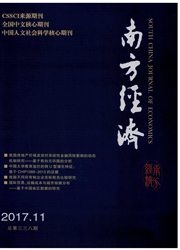

 中文摘要:
中文摘要:
本文假设最终品具有Leontif生产函数,需要高端和低端两种中间品。任何劳动者生产低端中间品的效率都是相同的,而高能力者生产高端中间品的效率更高。能力越高者,其文凭获取成本越低,因而是否获得文凭具有信号传递功能。进一步假设劳动力市场是基于文凭分割的,即无文凭者从事低端中间品生产,有文凭者可在从事高端和低端中间品生产之间进行选择,并能享受额外的福利租金。分析表明,如果文凭获取难度太大,经济体将会出现文凭持有者相对不足的结构性失业;反之,如果高校大幅扩招(文凭获取难度下降)而与文凭关联的福利租金却又很大时,经济体将会出现文凭持有者相对过剩的结构性失业,即造成近年来引人注目的高学历失业现象。
 英文摘要:
英文摘要:
We assume that final product has Leontif production function with two intermediate products, one low - ended and the other high - ended. Every labor has the same productivity on the low - ended product. However, those with higher ability are more productive on the high - ended product, and they also have lower cost to obtain a diplomat, which means that diplomat has signaling value. We further assume that labor market is segmented based on diplomats, i. e. , the labors without diplomats can only produce low - ended product while diplomat holders who produce high - ended product can enjoy some extra welfare "rents". We show that when diplomat is very difficult to obtain, there will arise the structural unemployment with insufficient diplomat holders. However, when higher education expands rapidly (diplomat becomes easy), there will arise the structural unemployment with excessive diplomat holders, just as what has happened in recent years in China.
 同期刊论文项目
同期刊论文项目
 同项目期刊论文
同项目期刊论文
 期刊信息
期刊信息
